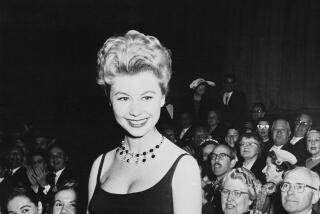One Spirited Actor Takes On Another
- Share via
John Barrymore, matinee idol of the 1920s, was also one of the greatest classical actors America ever produced, the Hamlet of his time. Likewise, Scottish-born Nicol Williamson is widely held to be the Dane of his generation.
So it’s particularly apt that Williamson is the one to play Barrymore in a one-man tribute to the late actor. His “Jack: A Night on the Town With John Barrymore” opens Wednesday at the Geffen Playhouse before its Broadway engagement next month.
But the Williamson-Barrymore similarities do not begin and end with “To be or not to be.” Both actors have also had their thespian talents eclipsed at times by other aspects of their public personas.
For Barrymore, it was a self-destructive streak that began with alcoholism at 14 and ultimately ruined him. Barrymore was also given to occasional flare-ups in the theater.
“He would do outrageous things sometimes onstage,” says Williamson, seated in the dimly lit house of the Geffen, as the final tech rehearsal was taking place.
*
“If people were coughing in the audience [during] ‘Hamlet,’ as they were carrying him out dead, he would sit up, turn around to the audience--and he did this a couple of times--and say, ‘All right, you can cough all you damn well want. I’m damn well [expletive] dead.’ And then they’d take him off.”
In Barrymore’s day, such behavior was given little notice. “They never ever reported this in the papers,” Williamson says. “They just glided over it and always referred to the greatness of him as an actor.”
But Williamson, who has been known to have his own Barrymore-like moments, has been cut no such slack.
On the second night of the London run of “Jack” in 1994, Williamson remembers he stepped forward, stressed and overtired, and told the audience that he was unable to continue. Predictably, he was given a drubbing by the London press.
Although Williamson has been widely praised during the course of his career--the London Times’ Bernard Levin called “Jack” “acting not just on the grand scale but acting that breaks the scale to pieces”--he has also been plagued by a reputation for cantankerousness.
Seated next to a reporter in the theater, however, none of this putatively testy behavior is in evidence. The chiseled-featured actor looks as regal as ever, wearing casual clothes but clutching a gray felt fedora in his hand, like a talisman of bygone Broadway glamour.
Now in his mid-50s (though he quips “30-what?” when asked his age), Williamson first broke through in the 1960s, in John Osborne’s “Inadmissible Evidence.” He played the role of an overbearing lawyer to acclaim in the West and on Broadway, and then appeared in the 1968 film of the play.
It was “Hamlet,” however, that truly made Williamson’s name. Tony Richardson made a film of his performance and the actor was hailed as the successor to Laurence Olivier.
Since then, Williamson--who has been based in New York for a majority of the time during the past 20 years--has performed in more than a dozen Broadway plays and appeared in a number of movies, including “The Reckoning,” “The Seven Percent Solution” and “Excalibur.”
During his most recent U.S. theater outing in 1991--in Paul Rudnick’s “I Hate Hamlet,” where Williamson was given a grilling in the press for poking his co-star with his sword--he came under Barrymore’s spell.
While playing the role of Barrymore’s ghost, Williamson began to read up on the late actor’s life and work. “He did what no other actor, living or dead, has ever done,” he says. “He was a vaudeville man, a light comedian, a matinee idol [and] a silent star who then became a talking picture star.
“And in the middle of all this, he became the greatest classical actor in America and the Hamlet of his generation,” he continues. “Not bad. Nobody else has ever done that. Olivier didn’t come near it.”
Williamson turned to director Leslie Megahey to help him write, and later stage, “Jack.” More than anything, the actor wanted the show to be an homage to Barrymore’s versatility.
“I wanted to give myself the ultimate test of putting forward everything that this man was,” he says. “What is in this is vaudeville, light opera, crooning, grand opera, about 24 characters, material from the movies and also Hamlet, Romeo, Lear and Richard.”
Most of all, though, he wanted to convey Barrymore’s spirit. “What I loved about Barrymore was that he was not a wanker, he wasn’t maudlin at all,” he says. “Even when things were hardest for him, he would break [the mood] with a very wry or ironic joke.”
Fittingly, Williamson also tends to break up the conversation--with a few lines from the play here or a demonstration of dialect there. When a vaudeville sound cue comes blasting out, for instance, he pipes right up with the song. “Any miss, who likes to kiss. . . .”
Then, just as quickly, Williamson returns to the tale of Barrymore’s decline. “The story is triumph and tragedy,” he says. “Barrymore was dissipated by his early 50s. He let himself go. He knew he wasn’t going to be playing those great roles anymore and it got to him.”
How much it got to him, only Barrymore’s ghost knows for sure. But Williamson may well be able to ask--since Broadway’s Belasco Theater, where “Jack” will open in April, is said to be inhabited by the great actor’s ghost.
“I can’t wait for one of the rooms to go ice-cold one night,” he says.
Then, as if to save the actor from any more such haunting thoughts, another sound cue fills the house. “How do you like Hollywood, Mr. Barrymore?” booms the voice of an unseen Tinseltown reporter.
The actor grins broadly, lifts his chin and shouts back, “Just dandy!”
Right on cue.
* “Jack: A Night on the Town With John Barrymore,” Geffen Playhouse, 10886 Le Conte Ave., Westwood. Tuesday-Thursday, 7:30 p.m.; Friday-Saturday, 8 p.m.; Saturday-Sunday, 2 p.m. $25-$35. (310) 208-5454 or (800) 233-3123 (Telecharge).
More to Read
The biggest entertainment stories
Get our big stories about Hollywood, film, television, music, arts, culture and more right in your inbox as soon as they publish.
You may occasionally receive promotional content from the Los Angeles Times.










